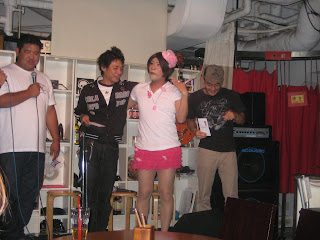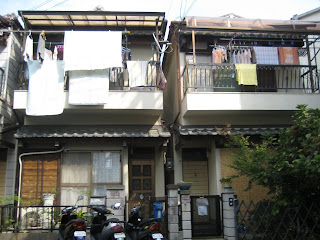
Even though the school has been very busy the latest weeks because of the final exams, I took some time to do internship at IKEA Osaka. I have been working on the Communication and Interior design department on IKEA in Sweden so I though it would be very interesting to see how they work here, if there are any differences even if it is a Swedish company and to meet Japanese people in the working environment. I went to IKEA this Wednesday and Thursday. For you who doesn’t know Com&in department, they work with all the commercial areas in the store to make attractive and inspirational homes and to display the products in a commercial and attractive way. I was lucky, this week the team worked to finish an apartment, built after the Japanese house standards to fit the Japanese needs and wants in the house. It is a huge project and the first "Japanese" house they built in an IKEA store in Japan. I actually thought that even if it is exactly the same products all over the world, that the rooms was designed to match the costumers needs in a specific country, but it’s not...IKEA is IKEA where ever you are. I was an assistant to one of the first interior designers and I did a lot of different things for examples, rigged lamps, sew curtains and furnished a Tatami room. A Japanese traditional house does not have a designed utility for each room aside from the entrance area, kitchen, bathroom and toilet. Every room is a multifunctional room where they can do many different things to save space. The family who "lives" in this house we designed for a family consists of mother, father and two small children. The challenge of this project was to have much storage space in each room. The children share on room, the parents have a bedroom and then they have a big living room with open kitchen area. The Tatami room is an extra room for play area for the children and for guests when they come to visit the family. A Tatami room is a Japanese home decor, Yori who is an interior designer at IKEA described that the Tatami add simplicity, style and elegance to the home. She also mentioned that the rug accommodates to the temperature, in the summer the rug is cooler and that it’s gets warmer in the winter. Japanese houses always seems to have the toilets separately, it must have to do with their obsession of cleanness. To separate the dirt from the bathrooms cleanness. Other interesting things that I noticed was the slippers had their specific place and that they needed storage in the hallway for baseball racks.

In the afternoon the Com&in chief who is Swedish buy the way, took some time to talk to be about IKEA and about the challenges to work in Japan. She said that the biggest challenge have been the whole IKEA team, seems everyone was new when IKEA opened in Osaka one year ago. With no IKEA experience and some of them did not even had experience with interior design. Everyday is a day of teaching and learning, but the Japanese people have some difficultness with learning by doing, and prefer to have classrooms teaching. Helena also mentioned that their view of time is different from ours. Everything they do take ages to finishes. Then she closed the meeting with saying that it is very interesting to work with people from other cultures and the Japanese people improving everyday on work. I am so glad that I took the opportunity to work at IKEA for two days, it is a work experience and it was very interesting to see cultural differences in the working environment. My last impression of Japan is wonderful, it’s always when you finally fit in and feel happy in the new culture that you have to leave. The Japanese people are really one of a kind, there can be some difficultness’s while communicating with them, but over all the Japanese people are wonderful people and I would like to go back to work in Japan.

Please visit Youtube for funny IKEA videos























